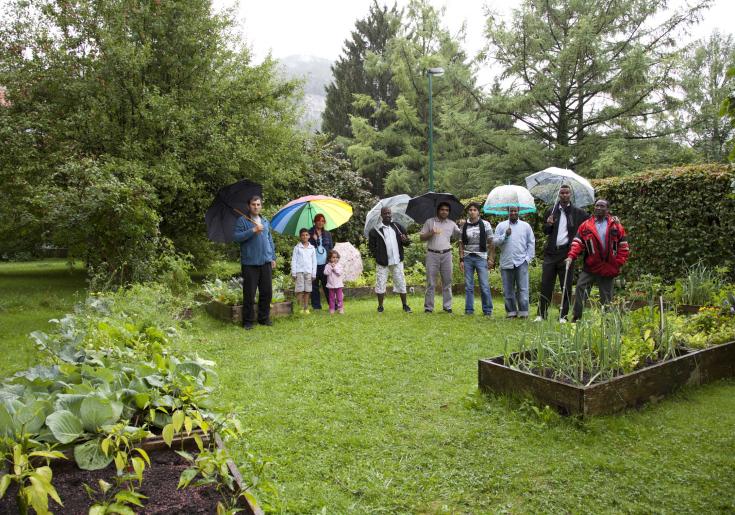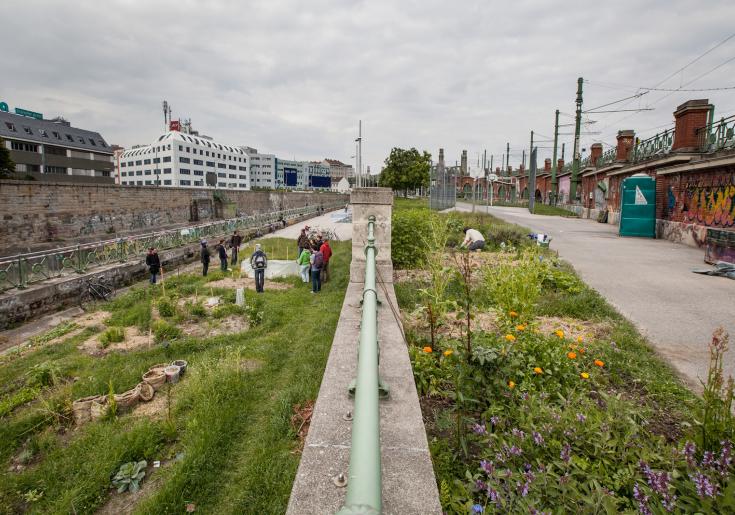-
What are community gardens?
-
'There are countless images and ideas of urban community gardens – as many as there are gardeners.
Indeed this is their essence and strength.' Malvin HasselCommunity gardens are more than places to grow vegetables. They are social spaces that facilitate meaningful communication and integration within communities.
There are community gardens all over the world. The idea of establishing community gardens goes back to the community gardens of the 1970s, which were established in New York City. At that time, the first community-driven projects were founded on vacant lots in various neighborhoods, creating new green open spaces in the middle of built-up urban areas. These activities led to a revitalization and activation of the neighborhoods.
The so-called “intercultural gardens” in Germany represent a special form of community garden, which is based on the ideas and goals of the international gardens project in Göttingen. In the middle of the 1990s, women from Bosnia, who were - due to the war - forced to flee their homelands, had the idea of looking after gardens again. The successful idea developed into a lighthouse project for many additional intercultural gardens, which came into being in Germany and have recently also started to bloom in Austria. The reason for this overwhelming success is inherent in the novelty of the idea itself: In our society, there are not many places where people with or without migration backgrounds can share an everyday interest.
Urban gardening and intercultural community gardens – Places to gather
People seek places where they can experience nature and enter into a dialogue with their fellow citizens. In urban areas, our interactions with plants and soil, as well as with our neighbors, are particularly important. Urban areas often only become inviting, integrated places through the efforts of individuals who take the initiative to revitalize public spaces. Urban gardening, small or big, can take place in an inner courtyard or on a vacant lot next door, be temporary or permanent, even mobile…
Green spaces in the city enhance the quality of life and create a sense of community.
A community garden is as colorful as the neighborhood itself!
A garden area, jointly looked after, allows for the mutual exchange of knowledge and skills, seeds and fruits, stories and experiences. Talks beyond vegetables are fruitful for any neighborhood. The elderly chat with other gardeners and reminisce about past experiences. Young families broaden their everyday areas of activity and rooms for gathering. The gardens offer attractions and opportunities for children, regardless of their origin, to acquire all kinds of practical knowledge and to experience nature. And these gardens help people with migration backgrounds to ”put down roots away from home.”
With this idea of community intercultural gardens in mind, the association Gartenpolylog - GärtnerInnen der Welt Kooperieren (Gardeners of the World Cooperative) - has been established.
Further Characteristics of Community Gardens
Community gardens are about more than delicious, home-grown vegetables. They also help shape neighborhoods, offering opportunities for participation within a community and for developing a sense of community through cooperation. Community gardens are taken care of by people who live in the immediate vicinity. The main idea is to have a little piece of green space in your own neighborhood and to establish acquaintances in your district.
Some gardens focus on specific groups of people. For example, theme gardens focus on target groups, such as elderly people, children, or women with migration backgrounds, who get together in intercultural community gardens. Community gardens can take many forms, exhibiting the diversity that they promote.
However, there are some common elements: Community garden lots usually belong to public bodies, such as towns, local authorities, churches, and/or foundations. These public bodies often bear the costs of water, insurance, waste disposal, and so on, though sometimes gardeners have to cover a share of the costs. The use of a lot by a group of gardeners is usually agreed upon in a contract. The gardens are typically divided up into individual plots for every gardener and into communal areas. Community gardens can develop through grassroots initiatives, as well as through top-down initiatives (e.g. social and cultural associations that try to find a suitable space and create organizational structures before handing an area over to a community for gardening).
Community gardens as areas for political activity
A community garden provides scope for political action en miniature. Within open, democratic communication processes, concerns with regard to the layout of the garden, everyday gardening, and social interaction are negotiated and agreed upon. Participation and co-determination in the community garden project can provide an experience of civic empowerment, which has positive effects on both the community and the individual. In this context, a community gardener says:
I also see it as a political statement to say, o.k., let’s take our neighborhood into our own hands now and make something beautiful of it which will meet our demands and ideas, and create it as we wish. (…) This is a process where we can participate and co-create. (Julia)
Spaces for social activities
Community gardens are places of social cooperation, communication, mutual (neighborhood) support, and activity-based knowledge sharing. The social importance of community gardens is particularly important in big cities, where anonymity and the barriers that cause social segregation can be overcome.
This is where I find community. I am not alone when doing something. We all really do this together. Work together. It’s that simple! (Alexander)
Spaces for learning
Community gardens can also provide scope for pedagogical activities. A garden provides various opportunities to gain knowledge and to experience nature. Their potential in the field of social education is evident, as community gardens become a part of both the daily lives of the people involved and the common good among them. The gardeners are given individual responsibility, thereby fostering active participation and citizenship.
Furthermore, community gardens bring new opportunities for orientation, reflection, and empowerment. The garden facilitates knowledge of oneself in a completely new context, internalization of one’s own view of the self and the world, and meaningful autonomy.
(The garden) grounds me (and) gives me a sense of who I am. Right now, I am the one who acts, a small-scale farmer. (Kristof)
Spaces of ecological harmony and abundance
Community gardens allow for an ecologically-sound life within an urban context. Participants within the garden become more attuned to plant life cycles and less disconnected from the natural world. Fruits and vegetables become something more magical, meaningful, and valuable than items with a price tag in the produce section. Useful plants, long forgotten and unavailable in urban grocery stores, are grown on city lots. Municipal land is reclaimed, and with ecologically-mindful growing processes, once again becomes fertile habitat. Fertile habitat attracts insects, butterflies, and birds, which further reinforce soil-rejuvenating, plant-producing ecological processes. In a setting like this, community gardeners become symbiotic parts of a vibrant (and social!) ecosystem rather than isolated consumers within a disconnected cityscape.
-
Where can I find community gardens?
-
On our interactive garden map you will find community garden projects in Austria. These include gardens under construction, solidarity agricultural projects (CSA), and other garden initiatives such as guerrilla gardening, tree pit plantings, etc.
On our marketplace there is also the possibility to search for a garden project or to make a garden available.
-
How do I start a community garden?
-
Is choosing a suitable property the first step? Or is it possible to start with an interested group of people? Both are possible . . .
Experience shows that it is difficult to find a suitable property, especially in urban areas. Our recommendation is to start by gathering a small group of interested people in order to divide the often tedious founding work (search for space, dealing with authorities, research work, ...).
When looking for a suitable property, it is important to explore the area with open eyes. Fallow land, vacant lots, unused parks or green spaces, overgrown gardens - many areas can become flourishing community gardens. The owners of the potential areas must then be located and contacted. A look at the land register can help. Depending on the ownership structure, negotiations are then held with private individuals, municipal departments, companies, district heads, and / or municipal councelors. Often it is necessary to found an association to receive a lease or funding, which has liability-related advantages for the tenants.
In public spaces in particular, it helps to convince political decision-makers at the local or regional level of the value of your project. Our experience shows that lease agreements for community gardens are completed much faster if there is support at the district / municipality level.
Parallel to the search for space, the group should also get to know each other better and develop a common vision of the future community garden. Some questions to consider include:
- Should all areas be managed jointly, or will there be individual plots?
- How should community life be organized?
- How are decisions made?
The answers to these and many other questions are often recorded in a set of garden rules. On the Downloads (Networks -> Downloads) page you can find examples of garden rules and statutes (from associations).
How We Can Help
If you are about to start a garden, we cordially invite you to take part in our relevant educational events or in our regular network events. These are good opportunities to exchange ideas about garden projects. At our annual network conference, you can find inspiration and ideas for your own project by getting to know other people involved with community gardens.
In some federal states, there are organizations that can support you in the first steps. In our link collection, you can find several examples. We are also happy to help via our experience gained through initiating community garden projects. We offer long term support for garden groups in Vienna.
Lastly, in the marketplace section, you can search for a garden, or offer one if you have a suitable plot of land that you would like to transform into a colorful community garden.


